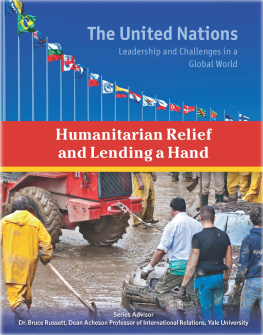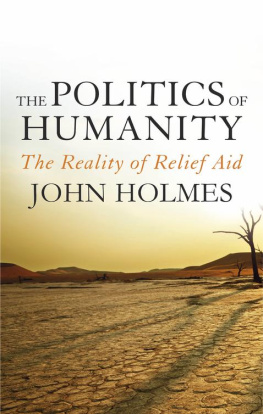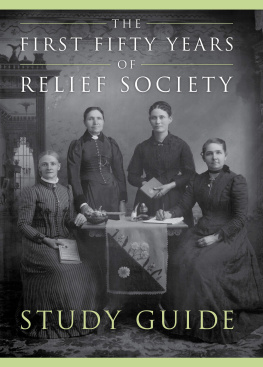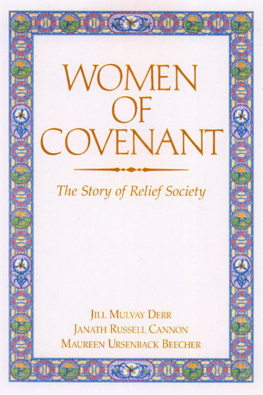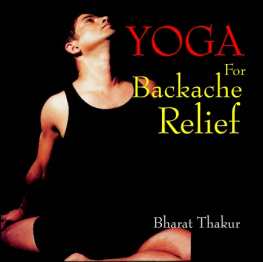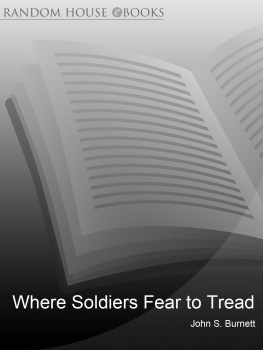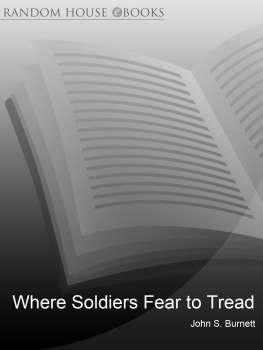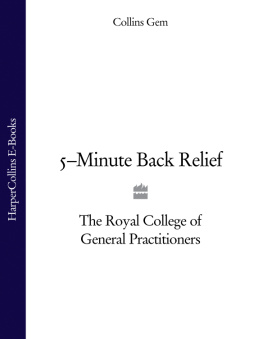This series offers a new interdisciplinary reflection on one of the most important and yet understudied areas in history, politics and cultural practices: humanitarian aid and its responses to crises and conflicts. The series seeks to define afresh the boundaries and methodologies applied to the study of humanitarian relief and so-called humanitarian events. The series includes monographs and carefully selected thematic edited collections which will cross disciplinary boundaries and bring fresh perspectives to the historical, political and cultural understanding of the rationale and impact of humanitarian relief work.
Calculating compassion
Humanity and relief in war, Britain 18701914
Rebecca Gill
Manchester University Press
Manchester and New York
distributed in the United States exclusively by Palgrave Macmillan
Copyright Rebecca Gill 2013
The right of Rebecca Gill to be identified as the author of this work has been asserted by her in accordance with the Copyright, Designs and Patents Act 1988.
Published by Manchester University Press
Oxford Road, Manchester M13 9NR, UK
and Room 400, 175 Fifth Avenue, New York, NY 10010, USA
www.manchesteruniversitypress.co.uk
Distributed in the United States exclusively by
Palgrave Macmillan, 175 Fifth Avenue, New York,
NY 10010, USA
Distributed in Canada exclusively by
UBC Press, University of British Columbia, 2029 West Mall,
Vancouver, BC, Canada V6T 1Z2
British Library Cataloguing-in-Publication Data
A catalogue record for this book is available from the British Library
Library of Congress Cataloging-in-Publication Data applied for
ISBN 978 0 7190 7810 1 hardback
First published 2013
The publisher has no responsibility for the persistence or accuracy of URLs for any external or third-party internet websites referred to in this book, and does not guarantee that any content on such websites is, or will remain, accurate or appropriate.
Typeset in 10.5/12.5pt Arno Pro
by Graphicraft Limited, Hong Kong
I would like to take this opportunity to thank individuals and organisations for their generous assistance in the research and writing of this book. This book is based on a PhD thesis submitted to the University of Manchester, and I first wish to acknowledge the unflagging support, enthusiasm and insights of my PhD supervisor, Bertrand Taithe, without whom this project would never have got off the ground. Thanks are owed also to Peter Gatrell and John Horne, my two examiners, for their careful reading and comments.
Since starting work at the University of Huddersfield, I have been fortunate to benefit from a period of research leave. I would like to thank my colleagues in the History Department for making this possible and for their consistent support while I was writing this book.
Over the years, I have profited from the insight and erudition of Jo Laycock, Helen Dampier and Emily Baughan and I would like to express my gratitude for their willingness to share their research and knowledge with me. I would also like to thank David Taylor, Brian Walker and Stphanie Prvost for taking the trouble to read drafts of this book.
Every attempt has been made to contact holders of copyright for the images and quotations from private papers that I have reproduced. For reproductions of illustrations and permission to reproduce photographs, acknowledgements are due to the British Library, the Library of Congress and the British Red Cross Museum and Archives. I wish to thank archivists at a number of institutions for making their collections available to me. These include the Wellcome Library (and the RAMC for making the Longmore papers publicly available); the London School of Economics library; the John Rylands Library, University of Manchester; the Bodleian Library (and the National Trust for making the Disraeli papers available for consultation); the Brotherton Library, University of Leeds; the Document and Sound Section at the Imperial War Museum; The National Archives; the British Red Cross Museum and Archives; and the Library of the Society of Friends, London. John Spencer of Bankfield Museum in Halifax was kind enough to furnish me with historical details of British Army uniforms.
Finally, a big thank you is owed to my husband, Andrew, whose love and encouragement made the writing of this book possible.
BLPES British Library of Political and Economic Science
BRCS British Red Cross Society
CBRCC Central British Red Cross Committee
COS Charity Organisation Society
FWVRF Friends War Victims Relief Fund
ICRC International Committee of the Red Cross
IWM Imperial War Museum
JRL John Rylands Library, University of Manchester
LSF Library of the Society of Friends
NAS British National Society for Aid to the Sick and Wounded in War
RAMC Royal Army Medical Corps
SACC South African Conciliation Committee
SCF Save the Children Fund
TNA The National Archives
VAD Voluntary Aid Detachment
Pity and sympathy would have inclined me to carry liberality to its utmost limits, but I endeavoured to keep my heart in subjection to my head. Yet, for all that they were beset by mockery, pecuniary difficulties and rivalry, the Order of St Johns attempt to revive a tradition of battlefield chivalry is an important strand in the history of modern relief work in Britain. It is with unravelling these rather tangled origins that this book is concerned.
Furleys attempt to subject heart to head resounded in many accounts of relief work in this period. Not all of these arose from the experience of organising assistance to wounded combatants. Others recounted missions to aid civilian populations caught perilously in the grip of war. Aid to the suffering in war was hardly new, of course, but an impulse to rationalise and organise was. Furley and his colleagues were only too happy to remind the public of the Hospitaller work carried out by the medieval Knights of St John during the crusades to the Holy Land. More recent examples included Florence Nightingales famous mission to ameliorate conditions in British army hospitals during the Crimean War. The Quakers, meanwhile, had been quietly providing assistance to non-combatants since the early 1800s. But by the late nineteenth century, a new generation of relief funds had arisen, singularly protesting their organisational proficiency, neutrality and impartiality, and trenchantly eschewing the partisanship and evangelism of earlier endeavours.
Accompanying Furley and his associates to the battlefields were a number of rival societies for the relief of war-time suffering. In theatres of war in nineteenth-century Europe France, the Balkans and in Britains wars of empire the Sudan, South Africa enterprising men and women opened soup kitchens, carried stretchers, nursed the wounded and delivered food and clothing to the destitute. These years saw the now ubiquitous Red Cross emblem first make its appearance on the battlefield. Emblazoned on armbands and ambulance wagons, it symbolised the neutral status that medical staff and their patients were granted by the 1864 Geneva Convention. As will be seen, not all of those delivering aid were convinced that the flourishing Red Cross movement represented an unqualified good, or were agreed as to its purpose. At home, meanwhile, impromptu warehouses overflowed with a miscellany of donations. When the Franco-Prussian War flared across the Channel, society ladies squeezed their way through stacks of packing cases to oversee the sorting and shipping of Bovril and pyjamas, Bengers invalid food, blankets, soda water and bandages. These scenes were replicated with each new conflict. Volunteers of both sexes abounded, and matriel was distributed in unprecedented quantities; some of this provided welcome comfort, on occasion it proved essential to life.


